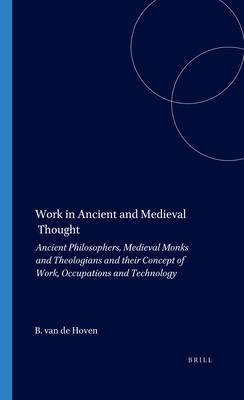
- Afhalen na 1 uur in een winkel met voorraad
- Gratis thuislevering in België vanaf € 30
- Ruim aanbod met 7 miljoen producten
- Afhalen na 1 uur in een winkel met voorraad
- Gratis thuislevering in België vanaf € 30
- Ruim aanbod met 7 miljoen producten
Zoeken
Work in Ancient and Medieval Thought
Ancient Philosophers, Medieval Monks and Theologians and Their Concept of Work, Occupations and Technology
B Van de Hoven
€ 170,95
+ 341 punten
Omschrijving
The main object of this study is to find out whether the differences between classical and medieval thinking about work, occupations and technology are so significant that we are justified in speaking of a real break between Antiquity and the Middle Ages in this connection; or whether there is a possible continuity of ideas. From a comparative perspective five themes are being researched to shed light on this ques-tion. In the first two chapters the author looks into the traditional view of negative ideas about work in Antiquity. Chapter three subsequently deals with monks and their attitude towards labour. In chapter four the place of the so-called artes mechanicae in medieval classifications of knowledge is being studied. In chapter five we find an analysis of twelfth-century sermons ad status. These three chapters principally deal with the question whether Christianity brought about a change in attitude towards work.
Specificaties
Betrokkenen
- Auteur(s):
- Uitgeverij:
Inhoud
- Aantal bladzijden:
- 306
- Taal:
- Engels
- Reeks:
- Reeksnummer:
- nr. 14
Eigenschappen
- Productcode (EAN):
- 9789050635578
- Verschijningsdatum:
- 1/01/1996
- Uitvoering:
- Hardcover
- Formaat:
- Genaaid
- Afmetingen:
- 165 mm x 246 mm
- Gewicht:
- 748 g

Alleen bij Standaard Boekhandel
+ 341 punten op je klantenkaart van Standaard Boekhandel
Beoordelingen
We publiceren alleen reviews die voldoen aan de voorwaarden voor reviews. Bekijk onze voorwaarden voor reviews.








